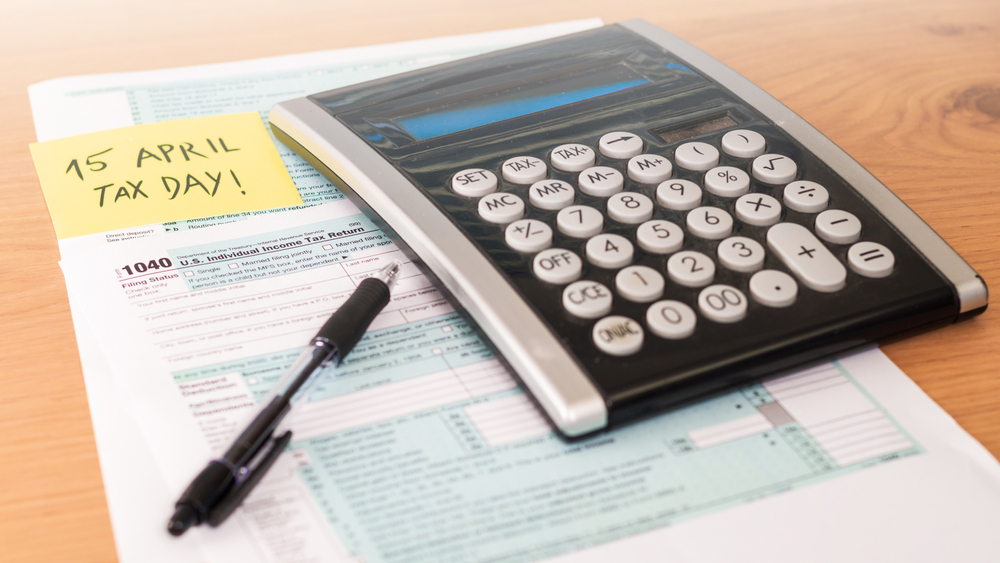What is the Vehicle Sales Tax Deduction?
Tax day might be dreaded by some individuals. This could be the day when taxpayers have to write out a large check to the U.S. Treasury or their state. For individuals and families who have overpaid their taxes, though, tax day might mean a refund and a little extra money.
Those who are looking to reduce their income might be researching applicable deductions. For individuals who purchased a car in 2021, deducting sales tax from that purchase could help out on tax day. What is the vehicle sales tax deduction? Here’s what filers need to know about this deduction.
The Difference between a Tax Credit and a Deduction
Tax filers might be familiar with two key terms that affect their returns: deductions and tax credits. These terms cannot be used synonymously, though, as they impact the tax return differently.
Deductions help to reduce the taxable income on a tax return. An example of this is deducting a charitable donation.
A tax credit, however, reduces the amount of tax owed. A credit can lower a filer’s tax responsibility. Some credits can only reduce a tax to zero, but others can result in a refund.
Credits and deductions all have specific guidelines, and it’s extremely important that tax filers follow the rules. Some expenses only can be partially deducted (denoted as a percentage); some credits have this stipulation, too.
In addition, not all credits can be taken by all filers. Credits might have income stipulations or they might come with other qualifying factors.
What is the Vehicle Sales Tax Deduction?
A vehicle sales tax deduction allows car buyers to deduct sales tax from the purchase of a vehicle. Not everyone can take this deduction, though. Tax filers who opt to take the standard deduction cannot deduct sales tax related to a vehicle purchase. This is due to the fact that filers must choose between either itemizing personal expenses or simply using the standard deduction.
In addition, if a tax filer itemizes their deductions on Schedule A and opts to deduct state income taxes, they cannot also deduct the sales tax from their vehicle.
There is also a limit to this deduction; tax filers cannot deduct more than the general sales tax rate. This means that if the tax rate was higher than the general rate, the filer can’t deduct that higher amount.
Filers who deduct the vehicle tax on their business expenses cannot also deduct the expense for their personal expenses. In addition, H&R Block explains that:
“There is a limit of $10,000 ($5,000 if MFS) on the amount of sales tax you can claim in 2018 to 2025. The $10,000 limit applies to the total amount a taxpayer can claim for real property taxes, personal property taxes, and state and local income taxes (or general sales tax if elected).”
Confused about these deductions? The Internal Revenue Service offers a page devoted to deductible taxes.

Are There Tax Credits for Vehicles?
While some tax filers might be able to deduct sales tax on their return, others could qualify for a tax credit. Those who bought an electric vehicle might be in luck for a tax credit related to this vehicle’s energy efficiency.
The Plug-In Electric Drive Vehicle Credit has a few stipulations. The IRS explains that filers can claim this credit “…if you purchased a car or truck with at least four wheels and a gross vehicle weight of less than 14,000 pounds that draws energy from a battery with at least 4 kilowatt hours and that may be recharged from an external source.”
The credit must be claimed the year that the individual started driving the vehicle, and the car must have been purchased in 2010 or after that date. The amount of the credit ranges from $2,500 to $7,500 (the amount is tied to the battery). The credit phases out when a manufacturer has sold 200,000 qualified vehicles.
As with every credit, there are details guiding who can or can’t claim it. Work with a CPA to determine if the electric vehicle purchased qualifies. Again, there are limitations as outlined by the IRS.
Other Vehicle Deductions
For many tax filers, there aren’t many options for deducting vehicle expenses. However, for those who are business owners or who are sole proprietors, some vehicle expenses could be deductible.
Before writing off vehicle expenses, though, filers should consult with a certified public accountant (CPA) or other tax professional. Again, filers must adhere to any rules associated with deductions. Business vehicle expenses often include certain stipulations for what can and cannot be deducted.

Tax Tips
Before filling out any tax form or taking forms to a pro, keep in mind a few tax tips to help simplify the process:
- Try not to wait until the last minute. Many filers procrastinate until tax day. If a pro is needed, there might be a line. Filing a little earlier also ensures that filers have time to find everything they need and get extra copies in case they are missing any forms.
- Keep all receipts. When taking any deductions, be sure to keep all the receipts documenting those write-offs. If the filer is audited, receipts serve as the proof that the deduction was taken correctly.
- File taxes electronically or send the returns via certified mail. If filers must mail their returns, sending them via certified mail can ensure that the filer has proof of their receipt.

Beware of Tax Scams, Too
Every year, the Internal Revenue Service alerts tax filers about any tax scams. Unfortunately, many fall prey to these scams. Here’s what to know about the most common tax scams:
The ‘You’re Going to Jail” Tax Scam
The popular scam plays out the same: the scammer calls an individual and pretends to be from the IRS. The robocall usually threatens that the individual will go to jail if they don’t pay. The IRS explains that it would not make jail threats via phone. Ignore this call. If an individual owes taxes, the IRS will make contact via a letter or other official communication, but they won’t leave a message that they are sending the local police. In addition, individuals can aid the IRS by reporting these calls!
The “Canceled Social Security Number” Scam
Another popular scam involves calling individuals and threatening to cancel their social security number. Typically, scammers will ask for a payment of back taxes. Don’t fall victim to this scam! Report any strange calls.
The Ghost Preparer Scam
What is a ghost preparer? This is a term to denote a dishonest and unethical tax preparer that will not sign off on a return. The lack of the signature is why they are called ‘ghost preparers.’ Be wary of any preparer who promises a certain refund or who schedules their fees based on the amount of a filer’s refund.
The IRS also explains on its website that scams can happen all year not just during tax time!
Other Ways for Car Owners to Save
While a car buyer might not be able to deduct the vehicle’s sales tax, there are other ways to save with a vehicle that have nothing to do with a tax return. While tax day might signal the time for a refund, others find that they owe taxes and this could dent their budget.
For those who might have a budget crunch, here’s how to save on car expenses:
- Download apps that help locate the cheapest gas in town. The savings might only be a few cents, but it could add up.
- Be on the lookout for coupons for oil change businesses. Jiffy Lube and others could mail out coupons or offer coupons online that save car owners money on basic services. Some businesses might have loyalty programs, too.
- Consider memberships to stores that offer lower gas prices. Sam’s Club and Costco both offer their own fuel pumps to members, and the prices can be much lower. Car owners who live near stores that offer this service could consider a membership.
- Consider refinancing a car loan with a high interest rate. Credit scores could improve over time. If the original interest rate was high, car owners might shop around for better rates if they have seen a bump in their credit score.
Tax time might be daunting for filers, but a vehicle might help offset the taxes owed or decrease the individual’s taxable income. However, individuals claiming a tax deduction related to a vehicle’s sales tax cannot also opt to take the standard deduction. In addition, the sales tax deduction for a vehicle also cannot be used if the individual deducts income taxes.
When taking any deduction or claiming a credit, there are stipulations and guidelines outlined by the IRS that filers must follow. Work with a CPA or tax professional to better understand these credits and deductions and know when it is applicable to claim or use them. In addition, all tax filers should be on the lookout for tax scams and ghost preparers. Beware of any preparer who promises a refund, and report any scam caller claiming to be the IRS.
Recent Posts
Categories
Luxury Cars
Trucks
Sedans
